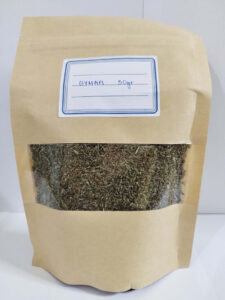What is thyme?
Thyme is a traditional herb, also known as fennel, honeysuckle or thyme. It is a fragrant shrub that when it blooms in summer, has pinkish-purple flowers that have a unique smell that attracts bees. There are over 400 species of thyme. In Greece, the common thyme (Thymus capitatus) is common, while in the Western Mediterranean the common thyme (T. vulgaris) is a cultivated form of the wild thyme (T. serpyllum).

Thyme and use
The range of uses of thyme in cooking is impressive. It is used as a spice in many cuisines, especially in Mediterranean cuisine. Its flavour is strong and slightly pungent. It is a key ingredient in certain sauces such as pesto sauce which you can use as a seasoning or add to pasta and rice.
The fresh leaves or whole branches of the plant can be used when preparing meat, poultry and even fish. It is one of the main ingredients of Benedictine liqueur.
In addition to its use in cooking, the herb also has an important reputation for its medicinal properties. It has antiseptic and antibacterial properties, which is why it has been used as a treatment for acne. Its various species have been widely used as a tea, tonic, antitussive and flatulence reliever. The volatile oil of thyme is expectorant, strongly antiseptic while the thymol it contains is an active antifungal.
To make thyme drink, we use dried thyme leaves and shoots which are placed in hot water to extract their nutrients. For a better taste you can combine it with thyme honey!
Thyme and properties
Thyme’s properties make it useful in chronic, fungal infections, as well as an effective remedy for lung infections such as bronchitis and pleurisy.
In its composition, it contains essential oils such as rosmarinic acid and ursolic acid, which have antispasmodic properties and can help in the treatment of bronchitis, throat irritation, cough, laryngitis, asthma, mouth inflammation and throat infections.[9]
The palatable infusion can be administered for throat and lung micro-infections, and the fresh leaves can be chewed to soothe an irritated throat.
Thyme is rich in vitamins and minerals such as Vitamin A, Vitamin C, B vitamins, folic acid, calcium, potassium, copper, fiber, iron and manganese.
Thyme and stability of cooking oils
Lipid oxidation is a serious problem during food processing and storage. It can cause a reduction in their quality, stability and safety. Scientists from Poland tested whether thyme extract can prolong the stability of sunflower oil at different temperatures. The conclusion was that thyme stabilises sunflower oil, which was attributed to its antioxidants.
Thyme is particularly rich in vitamin A and vitamin C, two important antioxidants. 100 g of T. vulgaris leaves contain 4,751 International Units of vitamin A and 160 mg of vitamin C. Vitamin A is vital for maintaining healthy mucous membranes and skin as well as good vision. Vitamin C fights pro-inflammatory free radicals. Thyme is also a rich source of flavonoids.






Reviews
There are no reviews yet.